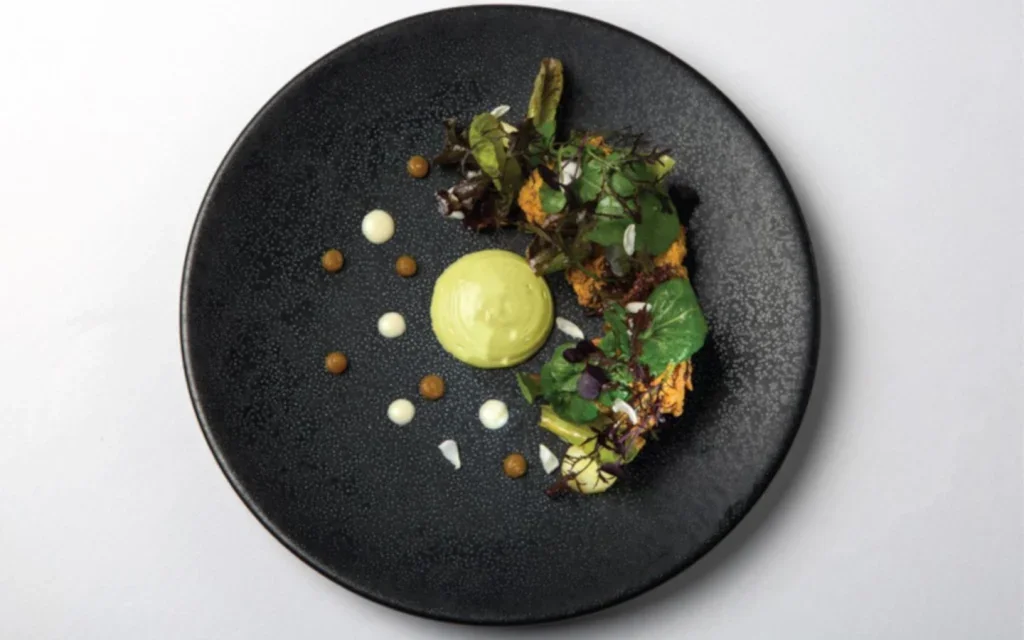
The UK capital’s celebrated vegan restaurant Plates London captured the attention of the culinary world earlier this year by earning a prestigious Michelin star. The review highlighted its “appropriately earthy, natural vibe”, noting how the slate floor, warm hues and rustic plastering contribute to an ambience that is both stripped-back and stylish.
With inventive dishes like maitake mushroom with black bean mole and a delectable raw cocoa gateau, Plates not only dazzles the palate but also redefines what vegan cuisine can achieve. Chef Kirk Haworth, the creative force behind the restaurant – alongside his sister Keeley – explained his passion for vegan cooking to the Guardian at the time, saying: “Trying to get rid of that word [vegan] is everything that I love about it. It’s just about flavour, that’s all it’s about. Flavour, excitement, innovation, and trying to take it to a new space of deliciousness.”
This Michelin accolade is not an anomaly. It underscores a broader industry shift, where creativity, sustainability and innovation in the kitchen are no longer confined to niche establishments but rather setting new standards in gastronomy.
The rise of plant-based hotels
In parallel with the rise of Michelin-starred vegan dining, luxury hotels are also rapidly integrating plant-based menus to cater to a discerning clientele. The forthcoming Açai Plant-Based Hotel in Rhodes, Greece, is set to open its doors in summer 2025, promising guests a seamless blend of sustainability and upscale comfort. Located just minutes from the iconic Old Town, Açai will offer a 100% plant-based culinary experience led by chef Giorgos Kliafas, making it an exclusive vegan restaurant on the island.
Guests at Açai can expect eco-chic designs that include sustainable materials, solar panels, wastereduction methods and all-vegan bath products in the suites. These hotels, along with established properties like Rhodes’ family-run Goji Vegan Hotel, represent a growing trend where luxury and sustainability coexist – a theme that resonates with the broader consumer movement towards healthier, environmentally friendly lifestyles. This shift in high-end hospitality not only caters to ethical diners but also reinforces the idea that plant-based ingredients can transform even the most opulent dining experiences.
Exploring alternatives in cuisine and hospitality
As hotels and gourmet restaurants increasingly highlight plant-based menus, a growing body of research underscores the benefits of meat alternatives. For example, it has long been accepted that legumes – such as soybeans, beans and peas – are generally considered beneficial for health, while traditional meat is often viewed as less advantageous. However, despite the health and environmental benefits of plant-based alternatives, changing diners’ habits remains a notoriously difficult challenge.
Most meat and dairy substitutes have lower levels of saturated fat and higher fibre compared with their animal-derived counterparts. They also boast significantly lower environmental impacts through reduced greenhouse gas emissions and more efficient use of water and land. Yet, the nutritional value of these alternatives can vary widely, depending on processing techniques, environmental considerations and brand-specific practices.

For instance, while many plant-based products meet dietary recommendations by providing adequate fibre and keeping saturated fat low, some fall into the undesirable category of ultra-processed foods (UPFs). Even so, research reveals that these alternatives – such as veggie burgers and plant milks – still offer health benefits over conventional meat and dairy products. A study led by Dr Marco Springmann at the Environmental Change Institute at Oxford University in the UK, and published in the Proceedings of the National Academy of Sciences (PNAS), provided a detailed analysis of meat and milk alternatives from nutritional, health, environmental and cost perspectives.
The study found that minimally processed legumes, particularly beans and peas, consistently outperform more processed options. In fact, substituting meat and dairy with these ingredients could reduce nutritional imbalances in high-income countries by about 50% and cut greenhouse gas emissions by more than half, while also potentially reducing mortality rates from diet-related diseases by roughly 10%. These findings echo the innovative culinary approaches seen in both Michelin-starred restaurants and upscale hotels, where the emphasis is on fresh, minimally processed ingredients that deliver superior flavour and nutrition.
A surprising star in the culinary landscape
A standout example from the study is tempeh – a traditional Indonesian food made from fermented soybeans. This unprocessed alternative retains much of the soybean’s nutritional properties, thanks to a natural culturing and fermentation process that binds the soybeans into a firm cake. Tempeh not only offers a rich source of protein, vitamins and minerals but also maintains a low environmental footprint, making it a compelling option compared with more heavily processed alternatives like veggie burgers. As consumer interest in both gourmet and hotel dining shifts towards plant-based options, tempeh’s versatility and nutritional benefits are garnering renewed attention. Chefs like Haworth are experimenting with innovative ways to showcase such ingredients, proving that even time-honoured foods can be reimagined for the modern, sustainability-minded diner.

Changing consumer habits and market trends
Despite the promising benefits of meat alternatives, consumer dietary habits remain deeply entrenched. In many high-income countries – including the UK, US and across Europe – meat and dairy consumption continue to dominate. However, there are tentative signs of change. The growing presence of plant-based dining in upscale restaurants and hotels is gradually shifting public perception and eating habits.
Springmann noted of the study, “Our analysis suggests that the costs of many meat and milk alternatives are a major factor limiting their popularity. Choosing basic ingredients such as beans and peas is not only cheaper but also better for health and the environment.” Yet, the allure of premium dining experiences – whether in a Michelin-starred restaurant or a luxury hotel like Açai – provides a platform for introducing these healthier alternatives to a broader audience. A recent pan-European survey by ProVeg, in partnership with the University of Copenhagen and Ghent University, found that 57% of respondents incorporate legumes into their diets at least once a week. Moreover, 43% plan to increase their consumption, provided that the products remain tasty, healthy and affordable. These findings suggest that while consumer habits are slow to change, the increasing availability of high-quality, plant-based dining options in both restaurants and hotels could serve as a catalyst for broader dietary shifts.
Emerging alternatives and future challenges
As the culinary world embraces the plant-based revolution, emerging alternatives such as pea protein, wheat gluten, and mycoprotein are gaining traction. Recent innovations include the use of proteins from oilseeds – like canola and sunflower meal – and even a resurgence of traditional ingredients such as fava beans. However, challenges persist. Concerns over hormonal effects from excessive soy consumption, particularly in vulnerable groups like pregnant women and children, have led to consumer advice in countries such as the UK, Norway and the Netherlands.
Additionally, issues related to pesticide residues and natural toxins (mycotoxins) present ongoing hurdles. Gijs Kleter, a food safety scientist at Wageningen University & Research, emphasises that while regulated products such as pesticides should be safe when used correctly, any significant change in consumption patterns would require a re-evaluation of current safety estimates. He also noted that soybeans, despite these concerns, remain competitively priced and nutritionally valuable – qualities that make them difficult to replace completely.
On the regulatory front, initiatives such as the EU’s ‘Farm to Fork’ strategy and the upcoming Deforestation Regulation (effective December 2025) aim to ensure that plant-based products are sustainably sourced. These measures are expected to bolster consumer confidence in the safety and environmental benefits of plant-based alternatives, further driving their adoption in both everyday diets and luxury dining environments.
Merging culinary innovation with sustainable hospitality
The convergence of high-end vegan restaurants and plant-based hotels signals a transformative era for the food industry. Michelin-starred establishments like Plates and luxury hotels such as Açai not only exemplify the art of sustainable cuisine but also highlight the broader potential of meat alternatives in reshaping dietary habits. From the robust flavour innovations championed by chef Haworth to the eco-chic hospitality of emerging vegan hotels, the plant-based movement is set to redefine how we think about food – merging gourmet appeal with environmental responsibility.
As research continues to underscore the benefits of minimally processed legumes and as consumer trends shift, the industry finds itself with a challenge that remains: to make these healthier, sustainable options not only appealing in a gourmet setting but also accessible for everyday consumption. Whether through the luxurious dining halls of upscale hotels or the innovative kitchens of urban vegan hotspots, the journey towards a more sustainable food future is well under way. With each Michelin star and every new eco-friendly hotel launch, the culinary world is writing a new chapter – one where flavour, sustainability and innovation go hand in hand to create a truly inclusive and forward-thinking dining experience.






